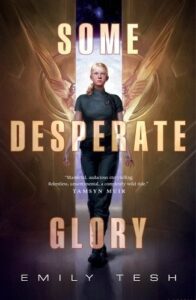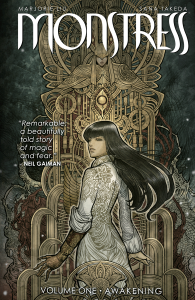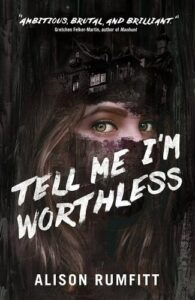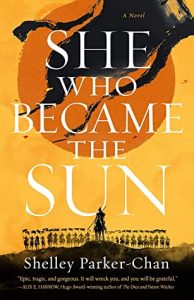Buy this from Bookshop.org to support local bookstores and the Lesbrary!
I thought about reviewing Emily Tesh’s Some Desperate Glory on here last month, right after I finished reading it, but I decided against it because I couldn’t figure out how to talk about in any sort of coherent way. My initial Goodreads review was mostly swearing and enthusiastic nonsense, because that is what this book did to my brain. But I thought about it more, and I decided that since I try to use my Lesbrary reviews to highlight sapphic books I love, it felt almost wrong not to talk about this one.
So what is this book about? To put it simply, it is a space opera that follows a teenage soldier who has spent her entire life training to avenge planet Earth’s destruction. After she is assigned not to fight but to instead spend her life bearing children, she ventures off the station she was raised on and discovers there is much more to the universe than she ever knew. This book is not simple at all, though—not even a little bit. This story almost never went where I expected it to go. I was hooked right from the beginning, but by the halfway point, I could not have put it down for anything. The best word I can think of to describe my experience is wild.
For all its wildness, however, nothing in this book felt random, or like it was only meant to shock the reader. Tightly plotted and visceral as hell, this book had me screaming because it went exactly where it needed to go, even if I never could have predicted it myself.
Perhaps the most impressive thing about this very impressive book, more than the world-building or the tight plot, is the protagonist’s journey. At the risk of saying too much, Emily Tesh managed to take Kyr from a head I could not stand being in, full of instilled prejudices and an utter unwillingness to believe she was wrong, to someone I was genuinely proud of in only 400 pages.
I’m leaving this review shorter and vaguer than I normally would because while I don’t think this is a book that can be ruined by talking about it too much, I do think the best way to experience it is knowing as little as possible going in (while being safe: this is a heavy one, and I highly recommend looking at trigger warnings beforehand). Simply put, Emily Tesh’s Some Desperate Glory is a masterpiece, and one that, for all its brutality, I know I will be reading again.




